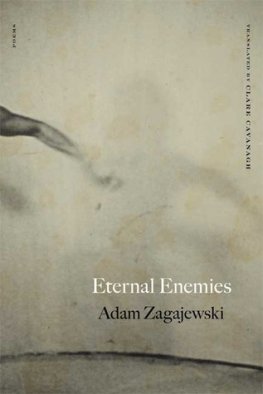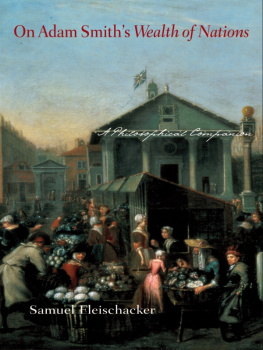Adam Zagajewski - A Defense of Ardor
Here you can read online Adam Zagajewski - A Defense of Ardor full text of the book (entire story) in english for free. Download pdf and epub, get meaning, cover and reviews about this ebook. year: 2004, publisher: Farrar, Straus and Giroux, genre: Art. Description of the work, (preface) as well as reviews are available. Best literature library LitArk.com created for fans of good reading and offers a wide selection of genres:
Romance novel
Science fiction
Adventure
Detective
Science
History
Home and family
Prose
Art
Politics
Computer
Non-fiction
Religion
Business
Children
Humor
Choose a favorite category and find really read worthwhile books. Enjoy immersion in the world of imagination, feel the emotions of the characters or learn something new for yourself, make an fascinating discovery.

- Book:A Defense of Ardor
- Author:
- Publisher:Farrar, Straus and Giroux
- Genre:
- Year:2004
- Rating:5 / 5
- Favourites:Add to favourites
- Your mark:
- 100
- 1
- 2
- 3
- 4
- 5
A Defense of Ardor: summary, description and annotation
We offer to read an annotation, description, summary or preface (depends on what the author of the book "A Defense of Ardor" wrote himself). If you haven't found the necessary information about the book — write in the comments, we will try to find it.
A Defense of Ardor — read online for free the complete book (whole text) full work
Below is the text of the book, divided by pages. System saving the place of the last page read, allows you to conveniently read the book "A Defense of Ardor" online for free, without having to search again every time where you left off. Put a bookmark, and you can go to the page where you finished reading at any time.
Font size:
Interval:
Bookmark:

The author and publisher have provided this e-book to you for your personal use only. You may not make this e-book publicly available in any way. Copyright infringement is against the law. If you believe the copy of this e-book you are reading infringes on the authors copyright, please notify the publisher at: us.macmillanusa.com/piracy.
Contents
1 A Defense of Ardor
From Lvov to Gliwice, from Gliwice to Krakow, from Krakow to Berlin (for two years); then to Paris, for a long while, and from there to Houston every year for four months; then back to Krakow. My first trip was involuntary, forced by the international treaties that ended World War II. The second was simply the result of an ordinary thirst for education (back then young Poles thought that a good education could be foundif you looked for itonly in ancient Krakow). The impulse behind the third was curiosity about a different, Western world. The fourth was motivated by what well discreetly call reasons of a personal nature. And finally, the fifth (Houston) was spurred both by curiosity (America) and by what might cautiously be termed economic necessity.
For over a hundred years Lvov had been the capital of Galicia, a province of the Hapsburg empire. It combined Western European cultural influences with an openness to Eastern emanations (though the East was certainly less obvious here than in Wilno or even Warsaw). Gliwice was once a provincial Prussian garrison town, with a history reaching back to medieval times. After the Second World War, the three elderly gentlemen ceded it to Poland. In school I learned Russian and Latin; I took private lessons in English and German. My familysforciblemove from Lvov to Gliwice was symptomatic of a great change. Though it was in fact annexed to the Eastern empire in 1945, my country had paradoxically been shifted westward at the same time: the consequences of this shift would surface only later.
My grandfather was bilingual; Polish was his second language, since he had been raised by his dead mothers German family. But it never even occurred to him to claim volksdeutsche status during the Nazi occupation. As a young man hed done a doctoral dissertation on Albrecht von Haller, which was written in German and published in Strasburg at the turn of the century.
In Krakow, I sensed the luminescence of all that was best in the Polish tradition: distant recollections of the Renaissance recorded in the architecture and museum exhibits, the liberalism of the nineteenth-century intelligentsia, the energy of the interwar period, the influence of the democratic opposition just then coming into being.
The West Berlin of the early eighties struck me as a peculiar synthesis of the old Prussian capital and a frivolous city fascinated by Manhattan and the avant-garde (sometimes I suspected that the local intellectuals and artists treated the wall as yet another invention of Marcel Duchamp). In Paris, I didnt encounter the great minds, the great French arbiters of civilizationId come too late for that. But I discovered nonetheless the beauty of one of the few European metropolises to possess the secret of eternal youth (even Baron Haussmanns barbarism hadnt ruined the continuity of the citys life). Finally, at this brief lists conclusion, I came to know Houston, sprawled on a plain, a city without history, a city of evergreen oaks, computers, highways, and crude oil (but also wonderful libraries and a splendid symphony).
After a time I understood that I could draw certain benefits both from the wartime disaster, the loss of my native city, and from my later wanderingsas long as I wasnt too lazy and learned the languages and literatures of my changing addresses. And so here I am, like a passenger on a small submarine that has not one periscope but four. One, the main one, is turned toward my native tradition. The other opens out onto German literature, its poetry, its (bygone) yearning for eternity. The third reveals the landscape of French culture, with its penetrating intelligence and Jansenist moralism. The fourth is aimed at Shakespeare, Keats, and Robert Lowell, the literature of specifics, passion, and conversation.
* * *
One August, the month when Europe relaxes intensively, we spent two weeks in one of its most beautiful landscapes, in Chianti, a part of Tuscany. A concert of chamber music was staged in the courtyard of a certain lordly manor, an eleventh-century monastery that hadnt held monks for centuries and had been transformed into a palace with a lovely garden. The audience for this concert was very distinctive, and consisted, with a few exceptions (one of them being the author of these words), of wealthy people possessing their own palaces, villas, and houses. This international company included a fair number of Englishmen (and also several Englishwomen who had decided for unknown reasons to behave like British clichs), a few Americans, and, of course, some Italians. In other words, the neighbors of the owner of this beautiful estate. Some of them only summered in Tuscany, others were full-time residents. The concert began with one of Mozarts early quartets; the four young women played wonderfully, but the applause was relatively sparse. I was a little annoyed and decided on the spot that it was time for a defense of ardor. Why couldnt the affluent audience appreciate this wonderful performance? Does wealth perhaps diminish our enthusiasm? Why didnt this ardent performance of Mozart meet with an equally ardent reception?
One of my vacation books at the time happened to be Thomas Manns essays, including, among others, a piece called Freud and the Future, a text written (and given as a lecture) in the thirties. What connection could there possibly be between the summer response of a rich crowd at a concert and Manns essay? Perhaps only that I also found a rather summery, ironic attitude at work in Mann, who was searching for a new intellectual orientation while writing Joseph and His Brothers. It goes without saying that Manns motivation had nothing in common with the blas audience at an afternoon concert. In the essay, Mann interprets Freuds chief purpose as being something like the work of a sapper in a minefield: were dealing with explosive materials of great force. Ancient myths conceal immense dangers; theyre bombs that must be defused. Of course we need to read Manns essays in historical perspective, recalling their context. The author of Buddenbrooks saw Nazism and fascism as a return to the energies of the mythic world, to the destructive violence of archaic myths, and hoped to resist this great wave of terror with the soothing substance of humanist irony. But this irony wasnt entirely defenseless, it wasnt simply abstract, chamber irony. It too was rooted in myth, but differently; it fostered life without recourse to violence.
Did Thomas Mann finally win? Since today, after all, we hear rather similar tones within the most au courant, postmodern circles. Irony, its true, has changed its meaning; its no longer a weapon directed against the barbarism of a primitive system triumphing in the very heart of Europe. It expresses rather a disillusionment with the collapse of utopian expectations, an ideological crisis provoked by the erosion and discrediting of those visions that hoped to replace the traditional metaphysics of religious faith with eschatological political theories. More than one Eastern European poet employed irony as a desperate defense against barbarismin this case, barbaric communism with its soulless bureaucracy (this time has passedisnt neocapitalism an adroit ironist?).
But no, Thomas Mann didnt win, it was a different irony. In any case, we find ourselves in a very ironic and skeptical landscape; all my four periscopes reveal a similar image. The last bastions of a more assertive attitude stand guard perhaps only in my homeland.
Font size:
Interval:
Bookmark:
Similar books «A Defense of Ardor»
Look at similar books to A Defense of Ardor. We have selected literature similar in name and meaning in the hope of providing readers with more options to find new, interesting, not yet read works.
Discussion, reviews of the book A Defense of Ardor and just readers' own opinions. Leave your comments, write what you think about the work, its meaning or the main characters. Specify what exactly you liked and what you didn't like, and why you think so.




